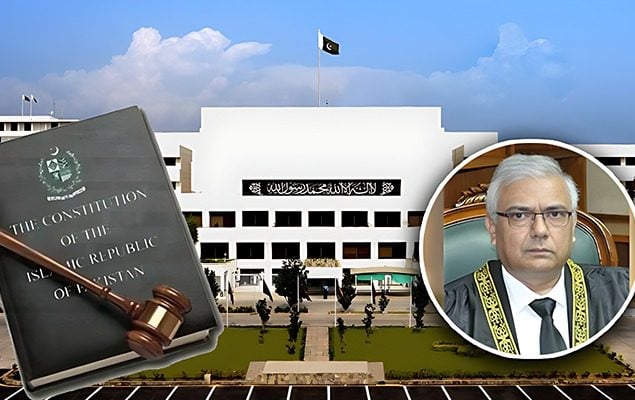
A notification from the law ministry stated that the appointment was carried out under clause (3) of Article 175-A, read with Article 175-C of the Constitution.
ISLAMABAD: President Asif Ali Zardari has approved the appointment of Justice Aminuddin Khan as the first Chief Justice of Pakistan’s newly established Federal Constitutional Court (FCC), marking a major milestone in the country’s ongoing judicial restructuring.
The appointment was made on the advice of Prime Minister Shehbaz Sharif, according to an official statement issued on Thursday, just hours after President Zardari signed the 27th Constitutional Amendment into law.
A notification from the law ministry stated that the appointment was carried out under clause (3) of Article 175-A, read with Article 175-C of the Constitution. It added that Justice Khan will formally assume office once he takes oath.
Justice Aminuddin, whose legal career spans nearly four decades, previously headed the now-dissolved constitutional bench formed under the 26th Constitutional Amendment last year.
Key Changes Under the New Constitutional Court:
The Federal Constitutional Court has been created as part of sweeping reforms introduced through the 27th Amendment. The court is set to feature equal representation from all provinces, while the president and prime minister will hold key roles in judicial appointments.
Significantly, several constitutional functions previously held by the Supreme Court—including the authority to hear constitutional matters and take suo motu notices—have now been shifted to the FCC. The new court may exercise suo motu powers only upon receiving petitions.
While debating the bill in the National Assembly, PPP Chairman Bilawal Bhutto-Zardari noted that the judiciary would no longer possess unilateral suo motu authority, remarking that both PPP and PML-N had previously borne the “consequences” of such powers.
Impact on the Supreme Court:
Chief Justice Yahya Afridi, who took oath on October 30, 2024, will continue as the top judge of Pakistan. However, after his three-year tenure, the senior-most judge among the Supreme Court and FCC judges will assume the position of chief justice.
The amendments also dissolved existing constitutional benches and introduced changes via the Supreme Court Practice and Procedure (Amendment) Bill 2025. Under the new rules, a three-member committee comprising the Chief Justice of Pakistan, the most senior judge, and another nominated judge will form benches for case hearings. Decisions will be made by majority vote.
Changes in Judicial Retirement Age:
The retirement age for judges of the new Constitutional Court has been set at 68—three years higher than that of Supreme Court judges, who retire at 65.
Read More News On
Catch all the Pakistan News, Trending News, Breaking News Event and Latest News Updates on The BOL News
Download The BOL News App to get the Daily News Update & Follow us on Google News.




